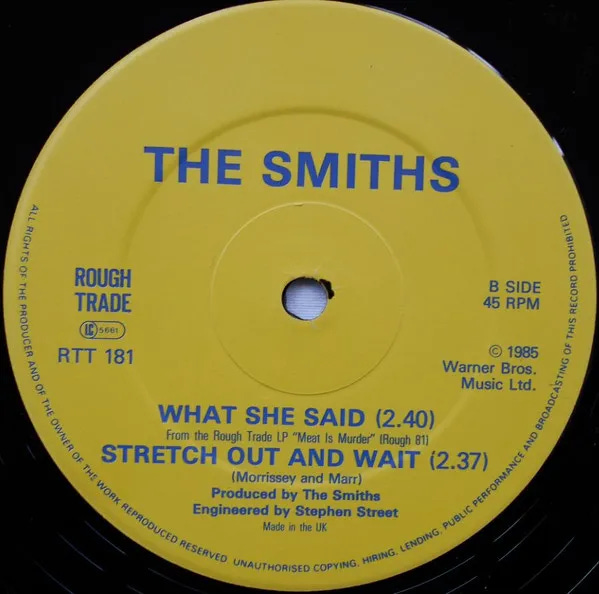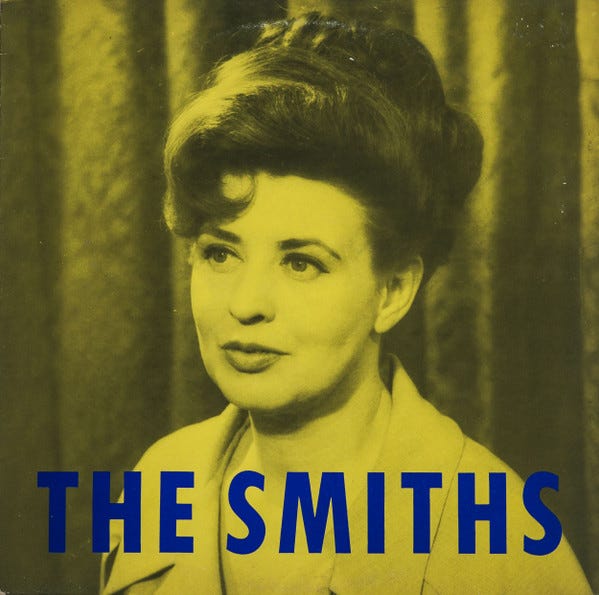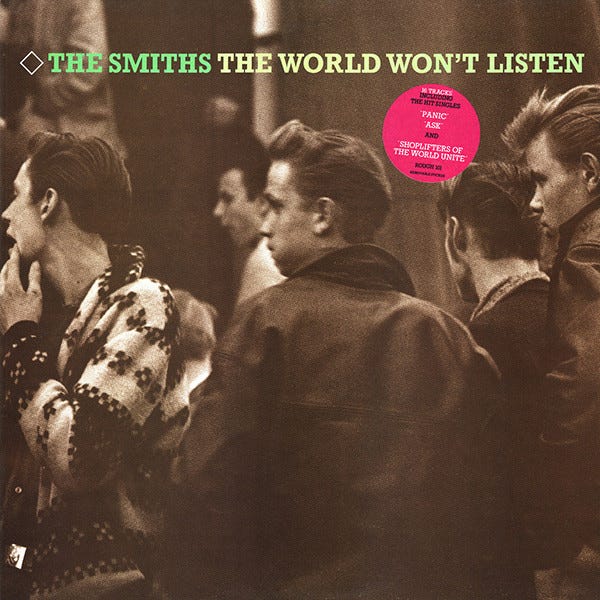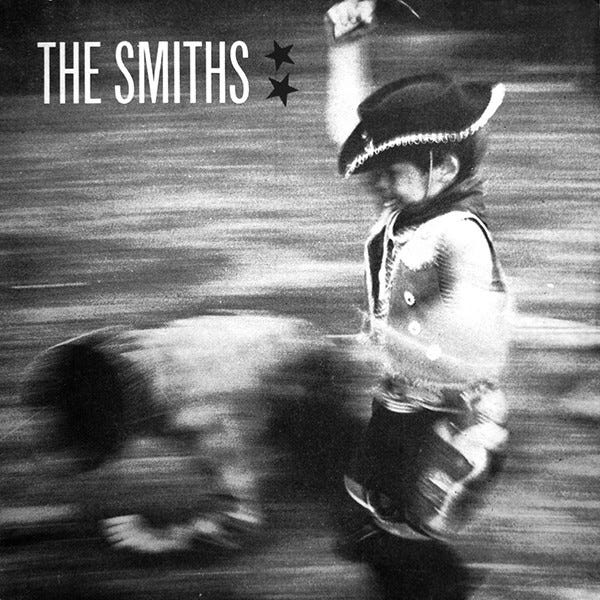"Stretch Out and Wait" was written by Morrissey and Johnny Marr in or shortly before January 1985, when the Smiths recorded it at Utopia Studios in Primrose Hill (Camden), London. Although the band is credited with producing the track, Marr took the lead in this role, with Stephen Street serving as recording engineer.1
Versions and Releases
"Stretch Out and Wait" exists in two studio versions and two officially released live versions. The two studio versions contain minor lyrical differences and have appeared across various singles and compilation albums.
Studio Version 1 (2:37). This version is often referred to as the original version. It was the first to be released. Opening lyrics:
On the high-rise estates
What's at the back of your mind? Oh the 3-day debate
On the high-rise estate
what's at the back of your mind?
Releases featuring Studio Version 1:
-B-side of the 12-inch “Shakespeare’s Sister” single, released March 18, 1985
-B-side of the 12-inch German release of the “Barbarism Begins at Home” single, released April 1985
-Louder Than Bombs compilation album, released March 30, 1987
-Complete box set (alongside Version 2), released September 26, 2011
Studio Version 2 (2:44). This slightly longer version, generally referred to as the alternate version, features revised lyrics primarily in the first verse with a subtle difference in vocal delivery. Opening lyrics:
All the lies that you make up
What's at the back of your mind? Your face I can see
And it's desperately kind
But what's at the back of your mind?
Releases featuring Studio Version 2:
-The World Won’t Listen compilation album, released February 23, 1987
-Deluxe edition of The Sound Of The Smiths compilation album2, released November 10, 2008
-The Smiths Singles Box limited edition compilation album3, released June 29, 2009
-Complete box set compilation album (alongside Version 1), released September 26, 2011
Live Version 1
Recorded March 18, 1985 at the Apollo in Oxford, England during the Meat Is Murder tour. Releases featuring Live Version 1:
-B-side of the 12-inch “That Joke Isn’t Funny Anymore” single, released July 1, 1985
-B-side of the 12-inch Netherlands release of “The Headmaster Ritual” single, released July 1985
-Reissue of “The Headmaster Ritual” single (UK, CD format), released November 1988
-The Smiths Singles Box Limited edition compilation album, released June 29, 2009
Live Version 2
Recorded August 5, 1986 at Great Woods Amphitheater in Mansfield, Massachusetts (alternately identified as being recorded live in Boston) during the Meat Is Murder tour. Release featuring Live Version 2:
-Deluxe edition of The Queen Is Dead reissue, released October 20, 2017
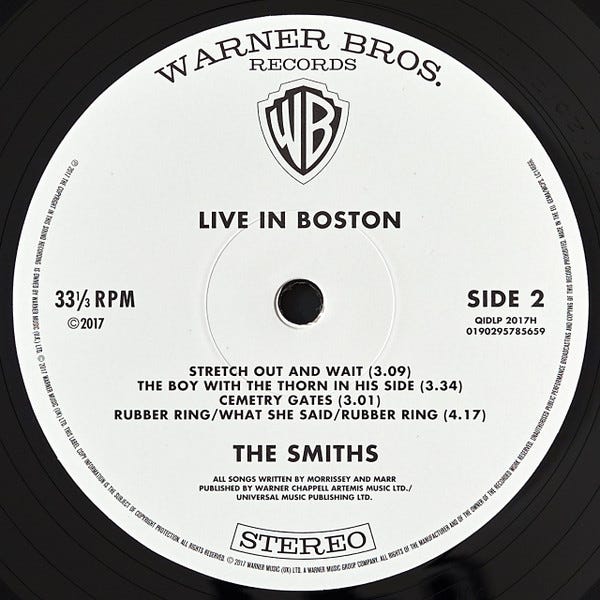
The Smiths debuted the song live at Golddiggers in Chippenham, England on February 27, 1985 (the first date of their Meat Is Murder tour). Morrissey introduced the song by saying, “This is a new song with a very relevant message. It’s called ‘Stretch Out and Wait.’” Over the din of applause at the end of the song, Morrissey quipped, “Oh come on, don’t pretend, you didn’t write it.”
Listen to the debut performance of the song in the following link at 51:24:
"Stretch Out and Wait" is a prime example of the Smiths’ paradoxical emotional tapestry - a song that merges a moody, introspective tone with a gently buoyant musical affect. Johnny Marr’s exquisitely melodic guitar work is as delicate as flotsam, his notes drifting effortlessly through the arrangement.
Andy Rourke and Mike Joyce bring a particularly subtle touch to the rhythm section. Rourke’s bass is strikingly fluid and rhythmic, characterized by both spaciousness and restraint. Joyce’s drumming is equally minimal, resulting in an understated sound that complements the song’s lyrical introspection.
Together, Rourke and Joyce craft a gentle rhythmic foundation that creates a soothing atmosphere, allowing Marr’s guitar and Morrissey’s vocals to float with unencumbered emotional weight.
Listen to the song with isolated bass and drums in the following link:
This musical gentleness stands in stark contrast to the gravity and uncertainty of Morrissey’s lyrics, yet the effect is far from incongruent. On the contrary, the lightness of the music amplifies the emotional weight, drawing the listener into a space that is strangely consoling - a comfort not born of resolution, but of shared vulnerability.
The song’s second verse is a study in hardwired biological force contrasted against societal conventions and modernity’s urban decay - the latter being a particularly sharp reflection of early 1980s post-industrial, Thatcherite Britain (“…general decay”):
Two icy-cold hands conducting the way
It's the Eskimo blood in my veins
Amid concrete and clay
And general decay
Nature must still find a way
So ignore all the codes of the day
Let your juvenile impulses sway
This way and that way
This way, that way
God, how sex implores you4
To let yourself lose yourself
This verse reveals the tension between the decaying rigidity of modern life and the irrepressible, primal forces within us - most notably, the drive to procreate and to connect, both physically and emotionally. Despite external pressures, these elemental urges not only persist, but demand fulfillment. The unstoppable force of nature is fundamental to the human spirit, manifesting as the impulse to break through societal conventions and restraints, even if only fleetingly.
Morrissey goes on to question the agency of a life fraught with existential uncertainty, voicing doubts that feel both intimate and universal:
Will the world end in the night time?
(I really don't know)5
Or will the world end in the day time?
(I really don't know)
And is there any point ever having children?
Oh, I don't know
The song’s central theme - the absence of a clear locus of control in life - is an unsettling statement. Conspicuously absent is any pretense of resisting this uncertainty. Instead, Morrissey suggests that the listener surrender to it:
Stretch out and wait
There is no debate, no debate, no debate
How can you consciously contemplate
When there's no debate, no debate?
On its face, the instruction to “stretch out and wait” is not a solution, but rather a kind of psychological balm. It acknowledges helplessness…not with despair, but with a strangely tranquil resignation. Rather than urging the listener to overcome uncertainty, Morrissey proposes that one can live both knowingly and fully while in its shadow. There is no clarity to be found, no grand answer to be discovered - only the calm acceptance of not knowing.
But the line that perhaps best captures the song’s emotional core is “All I do know is we're here and it’s now.” It’s a moment of stark immediacy, a resignation to the present, stripped of certainty, shorn of even a hint of idealism. Interestingly, this line echos the title of the earlier Smiths track “How Soon Is Now?”, which was released several months prior. Both works share a preoccupation with time, identity, and emotional isolation, though they approach these themes in subtly different ways. “How Soon Is Now?” is haunted by longing and deferred belonging, while “Stretch Out and Wait” surrenders to the moment with a sort of weary acceptance.
Morrissey's voice, characteristically languid yet emotive, hovers between melancholy and reassurance. There’s a sense that he’s not offering answers or solace so much as extending companionship in uncertainty—a gesture that lies at the heart of much of the Smiths' appeal.
"Stretch Out and Wait" embodies one of the Smiths’ defining traits: the ability to present emotionally complex, even painful truths within a musical arrangement that is as accessible as it is beautiful. The result is a song that doesn’t seek resolution, but instead acknowledges what it means to feel uncertain, and to carry on anyway…simply to be. To live.
The song’s gravitas is found in the simplicity of its central message: that sometimes presence itself - whether measured in moments, hours or decades - is all we have. Perhaps this is enough considering the fragility of life and the fickleness of fate.
Listen to version 1 (the “original” version) in the following link:
Listen to version 2 (the “alternate” version) in the following link:
Stephane. “Stretch Out and Wait.” Passions Just Like Mine, http://passionsjustlikemine.com/songs/songs-stretchoutandwait.htm. Accessed September 18, 2025.
While the song list on the back cover of the album indicates that “Stretch Out And Wait” is version 1 (the track’s duration is listed as being 2:37), in fact it is version 2 (the alternate version).
Disc 8 (covering the “Shakespeare’s Sister” single) and disc 9 (covering the “Barbarism Begins At Home” single) of this 12-CD collection should feature version 1 of “Stretch Out and Wait”, as this is the studio recording that originally appeared on the B-side of both singles. In addition, the track listing for both discs gives the duration as 2:37; however, the version found on disc’s 8 and 9 is the alternate one (version 2), which runs 2:44. Consequently, this album not only lists the incorrect track duration (twice), but also includes the incorrect version of the song (twice). See:
Passions Just Like Mine and Discogs
In an interview with Melody Maker (27 September 1986), Morrissey revealed his thoughts on this line as such:
“In the Smith’s song, ‘Stretch Out And Wait’, there is a line ‘God, how sex imploires you’. To make choices, to change and to be different, to do something and make a stand, and I always found that very, very encroaching on any feelings that I felt that I just wanted to be me, which was somewhere between this world and the next world, somewhere between this sex and the next sex, but nothing really political, but nothing really threatening to anybody on earth and nothing really dramatic. Just being me as an individual and not wishing to make any elaborate, strangulating statements.”
These lines bear a striking similarity to a bit of dialogue between James Dean (portraying James "Jim" Stark) and Sal Mineo (as John "Plato" Crawford) in the iconic 1955 film, Rebel Without a Cause:
PLATO: "You think the end of the world will come at nighttime, Jim?" JIM: "No. At dawn." PLATO: "Why?" JIM: "I just have a feeling."


